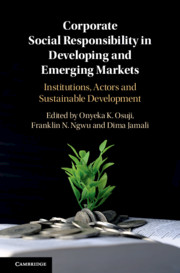 Corporate Social Responsibility in Developing and Emerging Markets
Corporate Social Responsibility in Developing and Emerging Markets Book contents
- Corporate Social Responsibility in Developing and Emerging Markets
- Corporate Social Responsibility in Developing and Emerging Markets
- Copyright page
- Dedication
- Contents
- Figures
- Tables
- Notes on Contributors
- Foreword
- Endorsement
- Preface
- Table of Cases
- Table of Legislation
- 1 Introduction to Corporate Social Responsibility in Developing and Emerging Markets: Institutions, Actors and Sustainable Development
- Part I Institutions, CSR Conceptualizations and Sustainable Development
- Part II CSR and Sustainable Development Cross-Country Studies
- 8 Firm Ownership and Corporate Social Responsibility in China: from a Multiple Stakeholder Perspective
- 9 The Dynamics of CSR, Mandatory CSR Laws, and Corporate Social Performance in India
- 10 Nigeria’s Informal Economy, Social Responsibility and Sustainable Development
- 11 The Environment in Shipping Incidents: Salvage Contracts and the Public Interest
- 12 Filling Institutional Voids in Thailand: the Case of Nestlé and the Seafood Coalition
- 13 Gender Composition of the Upper Echelons and Firm Sustainability Performance: an Examination of Istanbul Stock Exchange Companies
- Part III Normative and Utility Perspectives
- References
10 - Nigeria’s Informal Economy, Social Responsibility and Sustainable Development
from Part II - CSR and Sustainable Development Cross-Country Studies
Published online by Cambridge University Press: 18 December 2019
- Corporate Social Responsibility in Developing and Emerging Markets
- Corporate Social Responsibility in Developing and Emerging Markets
- Copyright page
- Dedication
- Contents
- Figures
- Tables
- Notes on Contributors
- Foreword
- Endorsement
- Preface
- Table of Cases
- Table of Legislation
- 1 Introduction to Corporate Social Responsibility in Developing and Emerging Markets: Institutions, Actors and Sustainable Development
- Part I Institutions, CSR Conceptualizations and Sustainable Development
- Part II CSR and Sustainable Development Cross-Country Studies
- 8 Firm Ownership and Corporate Social Responsibility in China: from a Multiple Stakeholder Perspective
- 9 The Dynamics of CSR, Mandatory CSR Laws, and Corporate Social Performance in India
- 10 Nigeria’s Informal Economy, Social Responsibility and Sustainable Development
- 11 The Environment in Shipping Incidents: Salvage Contracts and the Public Interest
- 12 Filling Institutional Voids in Thailand: the Case of Nestlé and the Seafood Coalition
- 13 Gender Composition of the Upper Echelons and Firm Sustainability Performance: an Examination of Istanbul Stock Exchange Companies
- Part III Normative and Utility Perspectives
- References
Summary
The informal economy is the source of livelihood for the teeming population of low-income earners in developing economies. Several studies have been conducted on the informal economy’s impact on Africa’s economic development and the neglect of the sector by the government in policy decisions. However, studies on social responsibility in businesses have largely neglected discourse on socially responsible practices in the informal sector, especially in Nigeria. In this regard, this chapter seeks to contribute to the limited extant literature on small business social responsibility in developing economies – specifically Nigeria – and how the exposition of such practices could contribute immensely to the sustainable development of the country. Employing the qualitative research methodology, the study explored how informal businesses conceive of socially responsible practice; what specific social responsibility they adopt; and how these practices could advance the sustainable development of the country. Findings from the study highlighted apprenticeship and credit sales as the major practices informal businesses engage in while also noting that such practices are integrated into the daily operations of informal businesses rather than as a separate department. The authors finally made some linkages between informal social responsibility and sustainable development and advanced some recommendations on the subject matter.
Keywords
- Type
- Chapter
- Information
- Corporate Social Responsibility in Developing and Emerging MarketsInstitutions, Actors and Sustainable Development, pp. 191 - 205Publisher: Cambridge University PressPrint publication year: 2019
References
- 2
- Cited by
